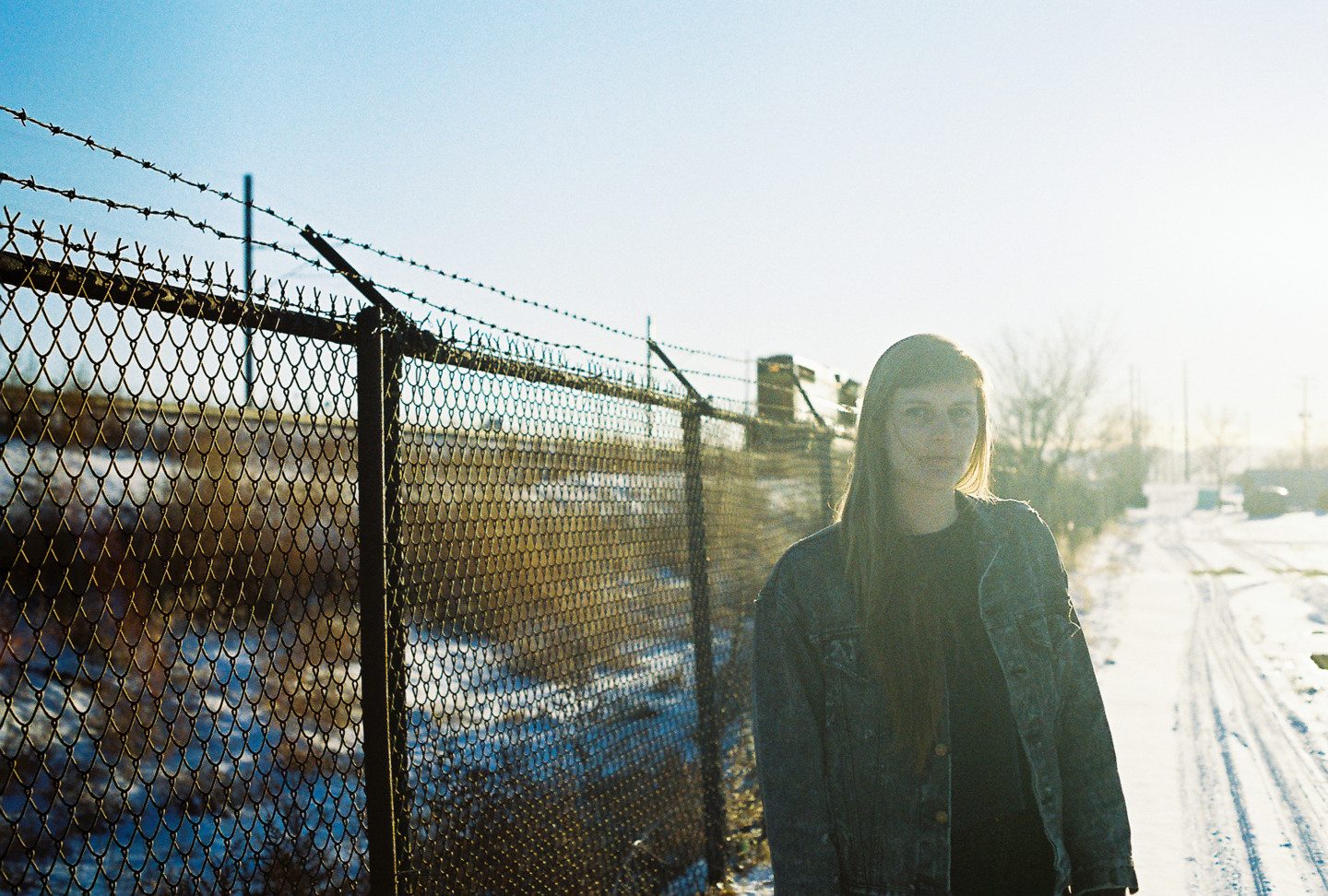On Forever, Midwife makes “heaven metal” to confront grief
Hear Forever, Madeline Johnston’s second album as Midwife, before its release this Friday.

Take a five-minute stroll from the South Platte River in Denver, Colorado, on roads that are wrinkled and worn like elephant’s skin, and you’ll find a cluster of industrial buildings. This is the city’s art district, home to several art galleries, music venues, and craft beer brewstations. On the periphery lies Rhincoeropolis, the former artist co-op which housed and provided a lifeline to 15 of the city’s local musicians. Madeline Johnston, who records under the moniker Midwife, was among them, living beside these artists in one of the venue’s windowless rooms, wiling away each day with her guitar and pedals, and being kept awake at night by the sound of others doing the same. She felt a temporary sense of connection and belonging. She recorded her debut album as Midwife here — 2017’s Like Author, Like Daughter — but more importantly, she found a needed friend in one of the venue’s residents, Colin Ward.
Not long before Like Author, Like Daughter's release, Rhinoceropolis closed its doors, as the city feared for the safety of its DIY venues following 2016’s devastating Ghost Ship warehouse fire. Little over a year after the venue’s closure, Colin Ward passed away unexpectedly. Where Madeline was once inspired by the Taostic chaos of a DIY venue, now she had only unyielding devastation to mould into sound.
Midwife’s second album Forever (premiering in full below ahead of its release this Friday, April 10) is, above all, a tribute to Colin Ward, but it’s also a meditation on choice and determinism — a guide to being a living thing; giving into the unexpected rhythms of the universe, and taking comfort in the permanence and certainty of death. It all swirls together with repetitive, trance-like phrases and hypnagogic guitars, in what Madeline calls "heaven metal." The FADER spoke to her about Colin, grief, and the further devastation wreaked upon her, and many musicians like her, during our current crisis.
The Midwife project seems to have been centered (and decentered) around Rhinoceropolis, why has this space been so intrinsic to your work, and will your future albums as Midwife have some relation to that space too?
Rhinoceropolis changed my life. When I moved in I felt I had really found my tribe. I began recording my own music and started developing the Midwife project there. I felt really supported by the people around me, and we fed each other creatively. There was a certain atmosphere of timelessness without consequences. As if time had been frozen and we had a world of our own creating to form as we saw fit. I learned so much about myself and my art practice. I learned to navigate my emotional landscape in this little universe of our own design. It was a feeling I’m sure I will never experience again; a unique and powerful energy. There was also a lot of darkness that inhabits that space. Like a rip current you had to be careful to not get carried under with. It was largely about balance. A perfect kind of chaos realm. I think my work has largely been about Rhinoceropolis because of its affecting nature, because of the profound experiences I shared there (within the full spectrum of emotions), and the people that surround and create it that had a huge impact on me. It’s the center of my universe.
What kind of state is Rhinoceropolis in today?
Rhinoceropolis is currently operating as a community-run venue and art gallery. It feels like it’s grown up a lot in its new iteration. Seeing it evolve and adapt as the landscape changes has been interesting. It is a little different now that no one is living there, but it has been self-sustaining which is really great to see, and makes me feel hopeful for the future of DIY. It feels especially important to see it survive in a Denver that is drastically changing all the time. I think this place, and spaces like it all across the country, are intrinsically important to the youth and helping artists find their voice, as it did for me.
Has 'home' always been an unstable concept to you?
Yes. I have always had a difficult time connecting with people and the world around me. I am forever trying to understand and attain the concept of “home,” the idea has become somewhat of an obsession in my work. I guess I feel at home where I feel like the truest version of myself.
Do you have somewhere to call home today?
I call Denver home, but I don’t feel at home. I feel less and less connected to the city as it expands and becomes more gentrified. I feel more and more alone.
Would your music sound different if, say, DIY venues weren't forced to close because of gentrification, and musicians were fairly compensated?
I think intrinsically important work is being created in the underground. I don’t know if this is because we struggle, or are living in a more inspired environment—“The more your grieve, the more you praise.” I can’t say what my music would sound like if these things were true, but I can be sure that if I lived in a different world, it would certainly impact my creative output and what kind of person I would become.
What does 'heaven metal' mean?
I made up my own genre, because I have a hard time describing what I do when people ask. I’m not sure where to place it. My little corner of experimental pop. “Heaven Metal,” to me, really means emotive music about devastation. “Heaven Metal” is something ethereal, emotive, painful, beautiful, and mostly cathartic.
Simply put, 'Forever' is an album of great beauty. What must a sound (a riff, a melody, etc.) make you feel in order for it to be incorporated into one of your songs?
Feeling. Meaning. It should speak for itself and also have something to say.
What do playing guitar, falling in love, and lying have in common?
Choices. Every choice we make has a consequence. Each decision has its own outcome. In “Anyone Can Play Guitar” I was thinking about determinism, doubt, and causality. How our choices stay with us forever (you can’t run for your whole life) and basically just wondering if there is any way to break the cycle of the futility of human nature. That the only rational thing anyone can expect is death.
This album is a tribute to your friend Colin. Can you tell us about him?
There is so much that I want to share. Colin Ward was a once-in-a-lifetime kind of person. I think Colin was the most prolific artist I’ve ever known. He was a master in every medium: painting, music, writing, video, movement, comedy… basically, anything he could get his hands on. He was constantly creating something or working on a project. A humble visionary. Colin was unbelievably inspiring and brought joy to the world and people around him. He was a planet that we orbit around. I feel honored to this day to have been invited to be a part of his world. Colin was great at bringing people together and thrived on chaos. He was larger than life.
Colin was extremely empathetic, loyal to his friends and community. I think he always put others’ needs before his own, like a true best friend does. He had a hard time behind it all, though, and struggled with drugs and fitting into society's structural constraints. I think he had a difficult time understanding how to survive in a world with rules that made no sense to him. I think that’s why he gravitated towards Rhinoceropolis and thrived there, a kind of lawless place. It was perfect for him but I think also encouraged some dangerous behaviors and patterns. Colin was psychically bonded to nature, interconnected to the earth, and felt the pain of the natural world. He deeply felt the weight of it all. Colin was an advocate for DIY and fought for radical action through artistic expression. He helped me understand what it means to be an artist. He helped me understand humanity and my place in the world. He was my teacher and a mentor to me and I will always cherish the time we spent together. [Ed. Note: Johnston wanted to share some of Ward's music and art. Click through for his paintings here, his work under Killd By here and Alphabets here; and his music on YouTube here, here, and here.
How do you interpret his beautiful poem on this album? How does it fit into the schema of Forever?
The poem is a beautiful embodiment of his spirit. I heard it for the first time soon after he passed and it felt like a premonition, a coded message he left behind, as if he knew he was going to die, and he knew he was going to die young. I interpret it as Colin being at peace. The poem was commissioned by Sterling Crispin in 2011, and is part of a larger project called Pure Becoming.
Did grief change the way you hear music?
Grief heightened my senses in a lot of ways, and for a while, I was extremely sensitive to music. Especially live music. When I’d watch someone perform I would feel it so deeply I’d just cry my eyes out. I think I became more empathic through my grief. Kinda went crazy for a while and disassociated from my life in an unhealthy way. Looking for messages or a sign. Just trying to understand it all. All I could do was cry.
How did grief affect the music and lyrics of this album?
I had a really hard time writing this album. For months I couldn’t even look at my guitar. I knew I had a lot to communicate, but I didn’t know how. It took a long time. I think the way around it, for me, was trying to take these large ideas and compress them into something really simple. There was a lot of comfort in knowing I wasn’t alone. It’s a wound that never heals.
Tell me about the recording process — where it took place, how long it took, what it felt like singing and tracking each of these songs.
This is the first thing I’ve ever made where I gave myself a timeline and a goal. I made it start-to-finish in 2019. I recorded it at my house in Denver and worked remotely with my collaborators: Tucker Theodore (with whom I co-produced Like Author, Like Daughter), Randall Taylor (Amulets), and Jensen Keller (American Grandma). Tracking the record was really powerful for me — it did get emotional at times, but it felt like a cathartic release. It’s become a timestamp of recovery, a poignant reminder.
Does it bring you some kind of peace knowing you won’t live forever? To me, the final track actually sounds hopeful, or at least sounds like you've found a way to continue living
Totally. Life is unpredictable. I think it’s best to take it for what it is and try to stay present in the moment. I think knowing you won’t live forever makes your time more meaningful. The song is an anthem for anyone who is struggling right now.
How has this current coronavirus moment affected you? What can people do to support you?
I had to cancel my six-week tour, which was going to be a celebration of the new record. I was really devastated after putting all of my energy into booking and planning it. I’d love folks to reach out to me to help re-book the run of shows this fall, or you can support me by listening to and purchasing my music.
